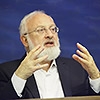Audio Version Of The Blog – 9/14/23
Listen to an Audio Version of the Blog
Download:MP3 Audio

Listen to an Audio Version of the Blog
Download:MP3 Audio
 Michael Laitman, On Quora: “Why is the Rosh Hashanah important?“
Michael Laitman, On Quora: “Why is the Rosh Hashanah important?“
Before discussing the importance of Rosh Hashanah, the Jewish New Year, it is important to understand that the Jewish holidays are not the tradition of one particular nation or people. They are rather symbols of unique spiritual states where we attain a common quality of love and bestowal in higher levels of our connection among each other and with nature.
If we attain a certain level of unity that is latent in nature, then we celebrate such an event. When we rise a little further to the next level of connection among each other and with nature, then we again attain a new degree of a unified perception and sensation of nature, and celebrate such an event.
Our own decision making plays no role in determining the holidays. Instead, we celebrate the attainment of certain levels of equivalence of form that are omnipresent in nature. We thus cannot change these holidays.
Nature is an interconnected and interdependent network of altruistic forces. It is a unified system where its every part is completely interlinked. We humans, on the other hand, are the only parts of nature that oppose and resist it with our egoistic desire to benefit ourselves at the expense of others and nature.
If we—humanity or at least a critical mass within humanity—will start undergoing a process of changing our egoistic quality into an altruistic one that is similar to nature’s, then we will approach nature’s unified form.
A key step in such a process is called “recognition of evil.” It means that we need to first reach a recognition of our inborn egoistic nature holding us back from experiencing the wholeness that exists in nature. In order to then change our egoistic nature into an altruistic one that is similar to nature’s force of love and bestowal, we require a deep inner scrutiny, which is called “prayer.” In Hebrew, to pray (“Lehitpalel”) means to “incriminate” (“Lehapil”) oneself. That is, we must incriminate ourselves, and such a confession leading up to Rosh Hashanah is called “the month of Elul.”
During such a scrutiny, we view our current low egoistic state in comparison to the exalted and whole altruistic state of love, bestowal and connection, which we wish to reach. The immense chasm between those two states give rise to a prayer, where we judge ourselves and express a great desire to change our egoistic intention into an altruistic one that is similar to nature’s.
We find how our egoistic nature turns us into criminals together with the discovery of an overpowering and much greater force above our egoistic powers, the altruistic force of nature, to which we wish to advance.
That state is called “Rosh Hashanah,” the beginning (“Rosh”) of our change (“Shinui”). It is the beginning of a new cycle of states through which we progress in order to become more and more like the loving and bestowing force of nature.
[317664]

Based on “A New Life” with Kabbalist Dr. Michael Laitman on September 14, 2014. Written/edited by students of Kabbalist Dr. Michael Laitman.
Photo by Igal Ness on Unsplash.
 So is the nature—he craves and each time imagines that he is already marching on the highway. And suddenly, he looks back to the place from which he came, and then leaves the highway and reconnects with the uneducated people and follows them (RABASH, Letter 21).
So is the nature—he craves and each time imagines that he is already marching on the highway. And suddenly, he looks back to the place from which he came, and then leaves the highway and reconnects with the uneducated people and follows them (RABASH, Letter 21).
The fact is that a person needs to leave the straight path in order to feel the need for the Creator’s help.
On one hand, if we do not have disappointments and all kinds of feelings of weakness on the spiritual path, then we do not need the help of the Creator. On the other hand, how can we descend into states where we need His help? We do not need to avoid difficulties. We just have to plunge into them and see that we cannot move forward, that the Creator specifically arranges all kinds of descents for us, from which we shout and ask Him to help us.
[317356]
From the Daily Kabbalah Lesson 8/18/23, “The need for the Creator’s salvation”
Related Material:
Falling For The Sake Of Rising
There Is No Room For Downtime Between Ascents And Descents
The Building Blocks Of Light And Darkness
 In the “Preface to the Wisdom of Kabbalah,” Baal HaSulam introduces a new concept of “Partzuf” (spiritual vessel), which is divided into rosh (head), toch (body), and sof (lower extremity).
In the “Preface to the Wisdom of Kabbalah,” Baal HaSulam introduces a new concept of “Partzuf” (spiritual vessel), which is divided into rosh (head), toch (body), and sof (lower extremity).
A Partzuf is a collection of desires connected by a single desire for the sake of bestowal.
In Kabbalah, one differentiates the Partzufim of Hochma that can receive for the sake of bestowal and Partzufim of Binah that are capable of only bestowing for the sake of bestowal.
The division of each Partzuf into three parts is due to the fact that it has a part that calculates whether it is able to receive the upper light for the sake of bestowal, the head (rosh). The middle part, toch (body), receives a portion of the upper light and enjoys it. The third part of the Partzuf, sof (lower extremity), located below the second part, does not receive the upper light and acts with the intention to stop it.
Besides those, there are many additional parts of the body, which in Kabbalah are designated as parts of the Partzuf (spiritual Kli, vessel). The Partzuf does everything with its parts that is necessary in order to receive the upper light for the sake of similarity with the Creator.
[316935]
From KabTV’s “Preface to the Wisdom of Kabbalah” 8/13/23
Related Material:
The Head And The Body Of My Soul
How Spiritual Life Is Born
Bestowal For The Sake Of Bestowal: A Clean-Up State
 Question: How do fear and awe of the Creator combine with the fact that I can lean on Him at any moment, that He is literally my support?
Question: How do fear and awe of the Creator combine with the fact that I can lean on Him at any moment, that He is literally my support?
Answer: Connect with the Creator as with a great friend. Awe of Him is not a fear of punishment; it is a great desire to connect with Him.
To transform fear for loved ones into awe of the Creator, include them in yourself and rise to the Creator.
[317502]
From the Daily Kabbalah Lesson 8/20/23, “The Need for the Creator’s Salvation”
Related Material:
There Is No Love Without Fear
Fear Before The Creator
Fear And Trembling
 Question: From about two years of age, a child wants to do everything by itself. We rejoice when we achieve some success on our own. In spirituality, we see that it is necessary to be disappointed in this “by myself.” What kind of metamorphosis should happen in us so that we do not strive for independent achievements, but only ask the Creator?
Question: From about two years of age, a child wants to do everything by itself. We rejoice when we achieve some success on our own. In spirituality, we see that it is necessary to be disappointed in this “by myself.” What kind of metamorphosis should happen in us so that we do not strive for independent achievements, but only ask the Creator?
Answer: There is no way for us to get closer to the Creator. He specifically arranges for us to be disappointed, not to understand, and to feel weak. So, we advance in semi-darkness.
Therefore, you will not be able to run away from the inferiority complex that arises in you, from the feeling that you cannot do anything.
This is done on purpose so that we understand that there is nothing in us, that all spiritual force is only in the Creator, and that we need to receive this force from Him.
[317418]
From the Daily Kabbalah Lesson 8/20/23, “The Need for the Creator’s Salvation”
Related Material:
Only If The Creator Helps
We Can Only Ask
Pray And Seek A Connection With The Creator
 And when he sees that he has already come to the village Kfar, i.e., to the quality of disbelief “kfira,” he begins to strive for faith again. (Rabash, Letter No. 21)
And when he sees that he has already come to the village Kfar, i.e., to the quality of disbelief “kfira,” he begins to strive for faith again. (Rabash, Letter No. 21)
Question: What is this quality of kfar and how does it manifest itself?
Answer: This is rejection of the Creator, the upper force. This is a very big force that we should avoid.
Question: What does it mean to look back in our work?
Answer: This is to look at what a person has gone through. He has no right to look back and check himself. He should look only forward to where he is more connected with his friends and with the Creator.
Question: What does it mean to cling and hold on to friends, to rely on them?
Answer: It means to cling to them and help in everything you can, not to use them, but to do everything for their advancement.
Question: How do I understand what the Creator wants to convey to a friend through me so that my action is not from egoism, but precisely from the Creator?
Answer: In this case, you need to connect with your friends as much as possible, and then the Creator will be with you.
Question: With a huge desire to fully reveal the Creator, how do I overcome the fear of not having time to do it?
Answer: You will have a sense of security only with your friends, only from connection with others.
[317387]
From the Daily Kabbalah Lesson 8/18/23, “The Need for the Creator’s Salvation”
Related Material:
Questions about Spiritual Work—14
Questions about Spiritual Work—13
Questions about Spiritual Work—12
 Question: You told a story about Rabash’s grandmother. When he was little and misbehaved, she did not punish him immediately but did so after two or three days. The same happens to us. After we have already misbehaved, we are told we did something wrong. How can we work with this so as to not just listen and run away but to properly use such situations for advancement?
Question: You told a story about Rabash’s grandmother. When he was little and misbehaved, she did not punish him immediately but did so after two or three days. The same happens to us. After we have already misbehaved, we are told we did something wrong. How can we work with this so as to not just listen and run away but to properly use such situations for advancement?
Answer: To do this, you need to be connected strongly with the group. You will not have the strength to do it yourself and will run away.
Therefore, you need to feel the group. Not even to talk to them about it but just to feel what it means to be in a group. Then, you will have the strength to connect with the friends again and feel the Creator in the center of the group. In this case, your future is secured.
[317457]
From the Daily Kabbalah Lesson 8/20/23, “The need for the Creator’s salvation”
Related Material:
How Can You Feel the Power of the Group?
Refocusing The Work In The Group Of Ten
When You Start Looking For A Group
 Michael Laitman, On Quora: “How do teachers effectively manage individualized instruction?“
Michael Laitman, On Quora: “How do teachers effectively manage individualized instruction?“
Effectively managing individualized instruction is indeed a problem in modern education. Nonetheless, we have to check what suits the children’s characteristics.
There are many instances of dividing the students into classes according to topics, but it is usually when they have grown up a little. In elementary school, we can also see children have their own inner direction, which becomes clearer with age, but we need to help them make their clarifications.
I think that teachers should be able to discern each student’s attitude to reality, their inclinations, interests and inner structure. Accordingly, I would group the students according to distinctive characteristics, such as sensitivity, intellectual aptitude, affinity for nature or technology, and more. By doing so, teachers can tailor their teaching methods to resonate with each group’s preferences and learning styles.
We can discerning students’ unique qualities by employing multifaceted teaching approaches. Instead of adhering to a single teaching style, we should explain concepts from various angles and provide examples from different fields. Such an approach lets students grasp the material in a way that aligns with their individual learning styles.
I recall my own school days when I sometimes struggled to comprehend a concept presented by a teacher. However, when my mother explained the same concept differently, using examples that resonated with my learning style, I gained a deeper understanding. This underscores the importance of flexibility in teaching and the potential of using relatable examples that cater to each student’s preferences.
When it comes to perceiving the uniqueness of every student, especially from a spiritual perspective, we, as teachers, can greatly benefit from inner preparation. I suggest that teachers view their role not solely as instructors of young children but as facilitators of the development of humanity to its final, perfect and eternal state of complete connection. In other words, the more teachers are aware of the way in which nature develops us all toward states of greater connection, then the more teachers can align their methods in a way that leads the students to increasing balance with nature. Recognizing that each student embarks on a unique journey in their development to a greater state of connection with others and nature can help us connect with our students on a profound level.
By considering the teaching process as a means of guiding the students to more balance with nature, we can transcend conventional notions and acknowledge the inner essence within each child. This shift in perspective empowers us to discover the distinct qualities in our students and offer a more profound level of fulfillment.
Effectively managing individualized instruction in teaching is a multifaceted task that demands sensitivity, adaptability and an understanding of each student’s uniqueness. By grouping students based on their characteristics, employing multifaceted teaching approaches, and adopting a spiritual perspective, we, as teachers, can navigate this challenge more effectively. Ultimately, our goal is to provide tailored education that enables every student to thrive on their unique path of learning and self-discovery.
[317624]

Based on “Ask the Kabbalist” with Kabbalist Dr. Michael Laitman on September 11, 2008. Written/edited by students of Kabbalist Dr. Michael Laitman.
Photo by Kenny Eliason on Unsplash.